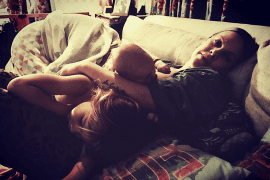By Cherie Raymond
The concept of ‘Baby Led Latching’ is so endearing and natural. It’s the opposite of the techniques I experienced in hospital with my son – the second my newborn dared to open his little mouth the attending nurse would grab my breast and shove it in his little mouth. I get the importance of a deep latch when breastfeeding, but the roughness just felt wrong and unnecessary (and it’s not a sight you’ll ever see in nature).
In my opinion, getting the right latch can be made unnecessarily stressful by overbearing nurses or lactation consultants (though I know there are so many fantastic professionals out there). The basis of baby led latching is to provide baby with a calm, relaxed environment, allowing him to follow his own instincts – no rush, no pressure.
Babies aren’t the helpless beings they’re made out to be, they’re a lot smarter than we give them credit for. They come equipped with reflexes that help them find and attach to the breast:
Getting to the breast: stepping and crawling motions
Finding the breast: searching and rooting
Attaching: rooting and opening
Sucking: stimulated by the presence of the nipple at the palate
Allow baby the opportunity and support to use his instinctive reflexes and you’ll be pleasantly surprised. Dr. Smillie, a pediatrician, lactation consultant, and baby led latching advocate puts it perfectly:
“I tell moms their job is not to “make” the baby latch, but simply to “allow” the baby to latch.”
Baby led latching is particularly helpful for newborn babies who are learning to latch, or for babies that have been put off breastfeeding by negative experiences. For them it’s important to allow the full sequence of instinctive reflexes to unfold, where one behaviour leads to the next.
See page 2 for the basic steps of baby led latching…











